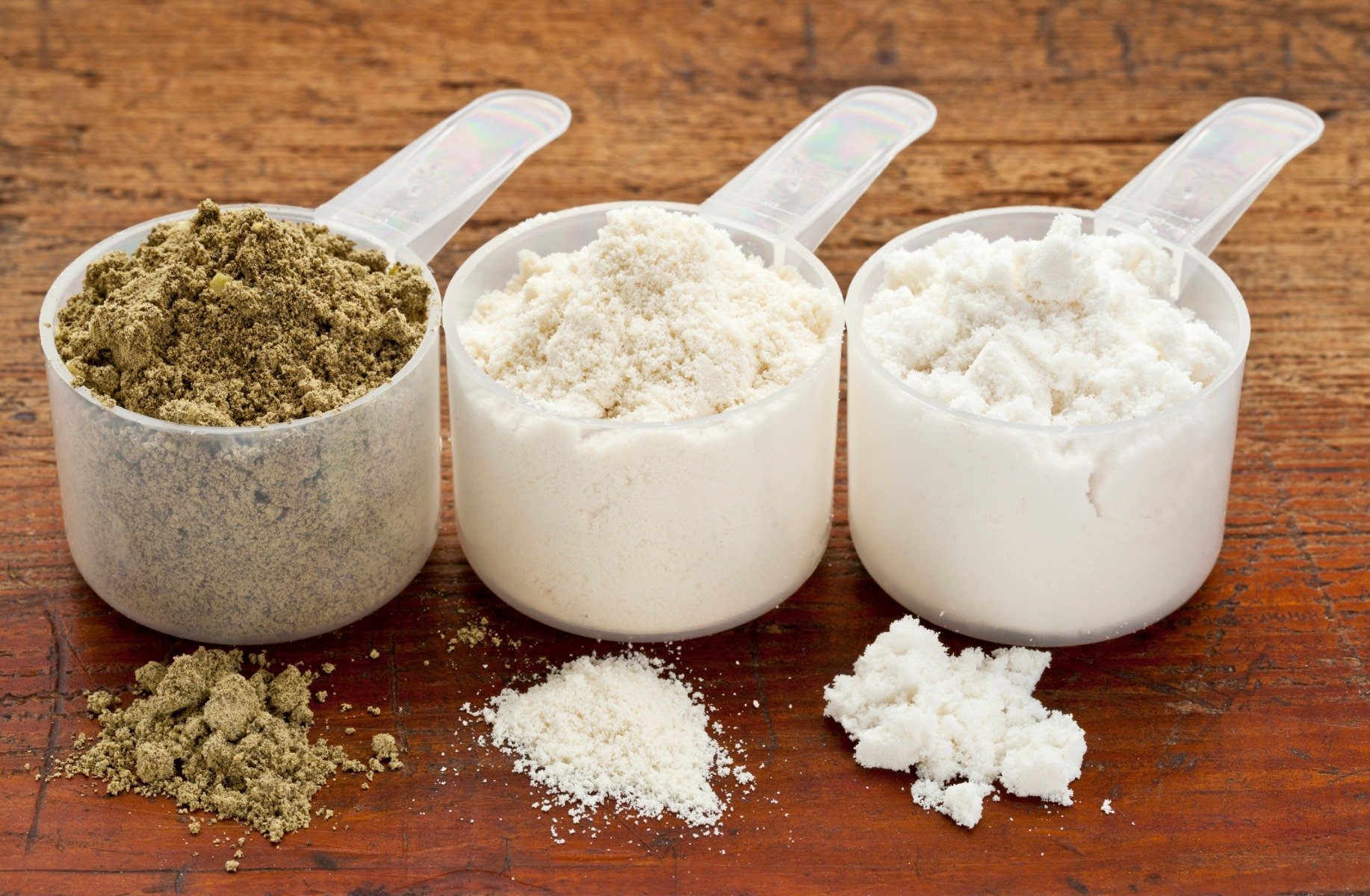First of all, it is important to recognize that proteins are strictly speaking foods . These are proteins that we get from food or from the form of dietary supplements . If you are trying to gain muscle mass or do the opposite in order to reduce weight, it cannot be done without proteins. Is the amount of protein obtained and the timing important for consumption?
Yes, that is important. Learn in the following lines How much protein to get and when. In the introduction you will learn how many grams of protein are good to achieve maximum results. You will also find that proteins make an essential contribution to the functioning of the correct body and a higher amount of protein is required for athletes. The tables show the amounts of protein you should get according to the scientific studies.
In the “When” section read that the timing of the amount of protein is not as important as receiving protein regularly throughout the day. Of course, if you want to achieve results quickly and effectively, we offer you various tips on how to divide the daily amount of protein in the morning, before training, after training, during the day and after sleep in the individual parts of the day can divide. Let’s get started.

How much protein should you eat daily?
Every cell in the human body contains proteins, which is why their daily sufficient amount is necessary for health. In addition to the positive influence on muscle growth, it improves hormone production, strengthens the immune system, and promotes hair and nail growth. It doesn’t matter if you get it from animal, herbal, or nutritional supplements. The optimal daily amount depends on various factors. That means, age, weight, amount of physical activity and your goals – if you want to lose weight or vice versa, you build muscle mass.
Minimum daily protein amount
Various studies have examined protein uptake and effects. Most worked on a daily dose of 1.5 g / kg protein. Few studies have examined a higher protein intake of around 2.2 to 3.3 g / kg. However, no research has shown evidence of the negative effects of proteins on healthy people. [1] For most people the amount of 0.8 g / kg is very low. Whether you are an endurance runner or a bodybuilder, the minimum daily amount protein is not enough for you. The more intensely you train, the more protein your body needs.

Optimal daily protein amount
Various studies examined the reception of proteins and their effects . The majority worked with 1.5 g / kg protein per day . Few researchers investigated the intake of a higher amount of protein around 2.2-3.3 g / kg . No research has proven the negative effect of proteins on healthy people. [17] In the attached table you will find the basic classification of the daily protein intake according to the main factors . [10 ]
| Healthy weight | Overweight and obesity | During the Pregnancy | |||
|---|---|---|---|---|---|
| Weight maintenance | Muscle growth | Fat loss | |||
| Sitting type | 1.2 – 1.8g / kg | not applicable | 1.2 – 1.5 g / kg | 1.6 – 1.7 g / kg | |
| Active type | 1.4 – 2.2g / kg | 1.4 – 3.3g / kg | 2.2 – 3.3g / kg | not defined | |
The table shows that if you are an active athlete , are not overweight and want to gain muscle growth, you should get 1.4-3.3g of protein per pound of weight . It’s a very wide range, so we have to add another factor – body weight.

Optimal daily protein amount
Optimal daily intake of protein for muscle growth The combination of strength training and the right amount of protein is the golden path to success . For this reason we have put together a table with ideal proteins that we receive daily depending on our body weight. It is the optimal amount, to ensure muscle growth for women and men.
| 45 kg | 63 g | 150 g | ||
| 57 kg | 80 g | 187 g | ||
| 68 kg | 95 g | 225 g | ||
| 79 kg | 111 g | 262 g | ||
| 91 kg | 127 g | 299 g | ||
| 102 kg | 143 g | 337 g | ||
| 113 kg | 158 g | 374 g | ||
| 125 kg | 175 g | 412 g | ||
The table shows that athletes and active adults can minimize the body’s fat growth by increasing the protein content to 3.3 g per kilogram of weight . [10] Therefore, a healthy adult athlete who wants to achieve muscle growth and who actually weighs 91 kg can receive 299 g of protein a day.

Studies have shown that exercising can make your body progressively obese and follow a hypercaloric diet (about 370-800 kcal). If you get protein at 3.3 g / kg, you lose more fat than if you eat 1.8 – 2.6 g / kg protein . It has to be mentioned that a higher amount of protein does not build more muscle than a lower one. It can help minimize the amount of fat consumed from food that is consumed more during a Volumetrics diet in order to gain muscle mass.
Remember that the daily amount of protein comes from your body weight should, not depend on calorie intake. Calorie intake should be prepared based on your weight and goals. For this reason, these amounts are related.
Optimal daily protein amount for weight loss
An older study had shown that athletes during the diet should consume around 1.8 – 2.7 g / kg . Recent studies have shown that athletes use 2.3 – 3.1 g / kg to minimize the loss of muscle mass during a diet should take. This higher amount has been confirmed by the International Society of Sports Nutrition.
The recommendation only applies to relatively slim people who are trying to shape and strengthen the body. Multiple research with obese people suggests that the appropriate amount for them is 1.2 to 1.5 g / kg to minimize fat loss. This value is confirmed by the European Association for the Study of Obesity, the 1.5 g / kg Recommended for overweight adults .

With regard to health issues related to overweight and obesity, it is also interesting that consumption of foods with increased protein content (about 27% of daily calorie intake) can lower cardiometabolic risk factories, including the Blood pressure or triglyceride levels. Plus, it helps get what you need Increase HDL cholesterol . However, these effects were only observed in small amounts.
In the table you will find an overview of the daily protein amount for healthy adults and for people who are overweight. The amounts are divided according to body weight in kilograms.
| Weight | Overweight or obesity | Healthy weight | ||
|---|---|---|---|---|
| Minimum amount | Maximum amount | Minimum amount | Maximum amount | |
| 45 kg | 54 g | 68 g | 100 g | 150 g |
| 57 kg | 68 g | 85 g | 125 g | 187 g |
| 68 kg | 82 g | 102 g | 150 g | 225 g |
| 79 kg | 95 g | 119 g | 175 g | 262 g |
| 91 kg | 109 g | 136 g | 200 g | |
| 102 kg | 122 g | 153 g | 225 g | 337 g |
| 113 kg | 136 g | 170 g | 249 g | 374 g |
| 125 kg | 150 g | 187 g | 274 g | 412 g |
Remember that the calculation of the daily amount of protein is based on your actual body weight and not on the ideal weight you want to achieve. In general, you should get 2.3-3 if you are on a diet to reduce body fat or if you want to exercise and minimize fat loss while not losing muscle mass. 1g / kg protein daily. People who are overweight or obese should consume 1.2-1.5 g / kg protein throughout the day.

Can protein be harmful?
You may have heard the myth that proteins damage the kidneys Cause liver failure or osteoporosis. The fact is that no study has supported this claim and there is no evidence of the negative effects of protein on the body of healthy individuals. As long as you have health problems with the kidney or liver, you should discuss the consumption of protein supplements with your doctor.
Can the increased amount of protein damage your health?
Consuming an increased amount of protein can lead to digestive problems such as gas or diarrhea. From this point of view, too, the optimal amount must be consumed and divided into smaller portions during the day.
How much protein should be added in a portion be included in training?
Many studies have looked at the question of how much protein should be consumed in one serving. Three older studies agreed that 20-25 g of quality protein is sufficient for maximum stimulation of protein production in the muscles.
However, a recent study questioned this result. The argument is that previous studies measured the amount of pure muscle mass not taken into account. Therefore, people who have a higher percentage of pure muscle mass also need a higher percentage of amino acids, to maximize the growth and regeneration of muscles after training . While this was not confirmed, the study found that protein synthesis in muscles after ingestion of 40 grams of whey protein is higher after training than after taking 20 grams.

In any case, a greater number of studies under the same conditions would be required in order for scientists to know which amount of protein per serving is most appropriate. Two studies that concluded that 20-25 g is the ideal portion for increasing protein synthesis carried out the study on a group of people who only trained legs. During the research that resulted in an ideal amount of 40 g , tests were carried out on the group of people who exercised the whole body. This may be another reason these studies disagree. A higher total amount of activated muscles during exercise likely requires a higher intake of amino acids after exercise than muscles that are only activated in legs.
It must be recognized that the muscle tissue consumes about 25 to 30% of the total ingested protein. That means that consuming a higher amount of protein does not necessarily have to support muscle growth. When you get 70g of protein in one serving , the effects on muscle growth can be the same as 40g of protein .The body stores the proteins for later, for example as an energy source for your next workout.
Everyone has individual needs – age, weight, level of difficulty of training, fitness goals and level of difficulty of training. Regardless of whether your one-off amount is 20 or 40 g, it is more important to get the right amount of protein distributed throughout the day and to divide the amount of protein received over the day – at least into 5 parts. By dividing this you continuously stimulate protein synthesis in Body.
When is the best time to get protein?
The exact time is not as important as the correct daily amount of protein. As mentioned earlier, it depends on your goals and your actual body weight. The most important thing is that you regularly receive 20-40g protein throughout the day. Still, the most important thing to keep track of is the amount of protein you eat each day, not the number of servings. The effective solution is to combine the right protein and timing. This can be divided into 5 phases – morning, day, evening, before training and after training.
1. In the morning
Studies have shown that the body is most sensitive to the effects of amino acids in protein 24 hours after training . [36] High quality, quickly absorbable whey protein is the ideal start to the new day and also an ideal breakfast for muscles with a combination of protein-rich foods such as scrambled eggs. If you want to replace breakfast with protein, gradually choose absorbable casein.
2. During the day
To get the required amount of protein, it is sufficient to replace the morning snack and the afternoon snack with a protein shake or protein bar or other snack. The additional protein reserves can be in the form of protein drinks or natural protein sources.
3. In the evening before bed
A protein shake before bed can be very effective in burning fat and at the same time in building strength and muscle. In this case, casein, also called night protein, is the most suitable choice. It absorbs and secures your muscles gradually , continuously providing you with protein as you sleep.

4. Protein before training
Protein drink before training has the same effect as after training. [32] Rapidly absorbable protein can help you build muscle tissue during exercise. If you choose to go for protein before training, whey protein is ideal. Not everyone can feel comfortable with protein while exercising and taking the essential amino acids BCAA (leucine, isoleucine, valine) is the most suitable alternative. A specific amino acid leucine can stimulate the cells that are responsible for muscle growth. [2] Most of the time when you are used to exercising on an empty stomach, because at that point your body is able to burn more protein than it produces, and this consequently leads to a loss of muscle mass. BCAA in soluble form must be taken 15 minutes before training in the form of capsules approx. 35 – 40 minutes before training.
5. Post-workout protein
Strength training stimulates muscle synthesis and simultaneously increases the risk of muscle damage . Consuming protein immediately after your workout can help you maintain a balance between muscle damage and its growth. A specific amino acid leucine can stimulate the cells responsible for muscle growth . That’s why we recommend quickly absorbable whey protein after training.
Der The exact point in time at which enough protein can be consumed after training is not known. The analysis from 2013 revealed information on the anabolic window that lasts 30 to 45 minutes after training. Nevertheless, the time from 30 to 45 after training is enough to supplement proteins. If you miss it don’t worry, you won’t lose the results. In any case, it is necessary to consume a lot of protein after training. This provides your muscles with the amino acids they need for growth and regeneration . Think about your choice of the suitable protein after training, because the absorption rate of the proteins depends on the type of processing of the specific protein Read more about the right protein selection in our article.
Reception of proteins by vegetarians and vegans
Vegetarians and vegans should pay attention how much protein they are getting and from what source. Only soy and quinoa contain all 9 essential amino acids that are necessary for protein synthesis in the body. Remaining sources of protein for vegans and vegetarians are not enough. For this reason, vegan and vegetarian proteins are often multi-component so that they can provide a complete amino acid profile. The daily amount of protein is between 1.5 and 2 g per kilogram , together with the amount of legumes and grains that secure the proteins required for the development and regeneration of muscle tissue for vegans and vegetarians can .
Have you figured out everything you need to know about the amount of protein and when? Write down what surprised you and what you already knew. If you like the article, support it by sharing it.
